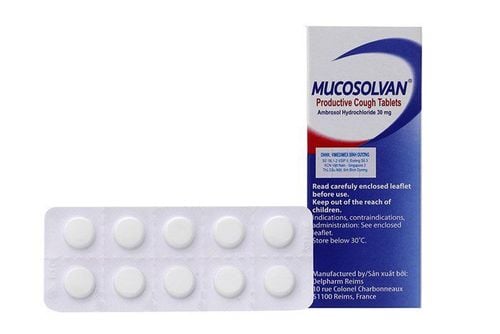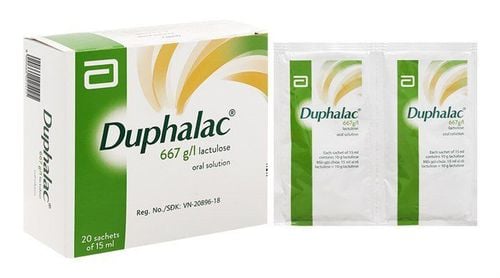This article is reviewed by Specialist Doctor I Le Nguyen Hong Tram - Gastroenterologist - Department of Internal Medicine - Vinmec Nha Trang International Hospital.
Enterogermina is a medication containing probiotics, which helps treat symptoms of diarrhea, dyspepsia, and restore the balance of gut microbiomes disrupted by prolonged antibiotic use. Proper use of Enterogermina requires a good understanding and adherence to the guidance of a doctor or pharmacist to achieve the best results.
1. What is Enterogermina?
Enterogermina is an oral suspension medication containing spores of multi antibiotic resistant Bacillus clausii. One of its significant benefits is that Enterogermina can be used during antibiotic treatment to prevent the imbalance between good and bad bacteria in the gut caused by antibiotics. Commonly used antibiotics include penicillins, cephalosporins, tetracyclines, macrolides, and aminoglycosides.
Enterogermina is available in two forms: one containing 2 billion probiotics per vial and another with 4 billion probiotics per vial. Dosages vary depending on the specific needs of each individual. When administered, the Bacillus clausii spores are delivered to the gut, helping restore good bacteria in the gut, improving the body’s absorption of nutrients, and maintaining the digestive system's microbial balance.
According to the manufacturer, studies assessing the presence and longevity of Bacillus clausii spores in various sections of the gut have demonstrated the following:
- Bacillus clausii spores are detected in stool samples and reach their peak concentration after just one day of treatment.
- The concentration remains relatively stable throughout the treatment period and decreases gradually over time (dropping to 50% of the peak
level by the 3rd to 4th day and returning to baseline levels by around the 10th day after starting treatment). - In animal studies, the concentration of Bacillus clausii spores in the gastrointestinal tract (stomach, small intestine, and colon) was found to exceed 100 million spores after a single dose.
2. Uses of Enterogermina
Enterogermina has several indications:
- Treatment and prevention of gut microbiota imbalances and conditions related to impaired absorption of endogenous vitamins.
- Supportive therapy to restore gut microbiota affected by prolonged antibiotic or chemotherapy use.
- Acute and chronic dyspepsia in children, caused by toxicity, gut microbiota disturbances, or impaired vitamin absorption.

3. How to Use Enterogermina
Before using Enterogermina, consult your doctor or pharmacist and carefully read the product instructions to ensure proper usage.
The dosage of Enterogermina will be prescribed by your doctor based on age and medical condition. Therefore, questions like "How long should Enterogermina be used?" or "Can Enterogermina be taken regularly?" should be addressed by your doctor.
Patients should follow their doctor’s instructions and avoid changing the dosage or frequency on their own without seeking medical advice. In addition, Enterogermina may be less effective if taken together with antibiotics, so doctors will plan the timing of its use accordingly.
Specific dosages for adults, children, and infants are as follows:
- Dosage for Enterogermina 2 billion CFU:
- Adults: 2-3 vials per day.
- Children: 1-2 vials per day.
- Infants: 1-2 vials per day.
- Dosage for Enterogermina 4 billion CFU:
- Adults: 1 vial per day.
- Infants and children: 1 vial per day.
How to Use:
- Shake the vial well before use. Twist off the top cap to open the vial . The contents can be taken directly or mixed with milk, tea, or orange juice. Once the vial is opened, use it within a short period to prevent spoilage.
- For cases requiring multiple doses per day, space the doses throughout the day. When taking antibiotics, Enterogermina should be taken between antibiotic doses to maintain its effectiveness.
- Missing a dose of Enterogermina is not a significant issue; however, maintaining consistent and correct dosing ensures better treatment outcomes.
- Small particles visible in the Enterogermina vial during use may be due to the aggregation of Bacillus clausii spores. This does not affect the quality of the medication.
There are no contraindications for using Enterogermina in patients with steatorrhea.
Storage:
Store this medication at room temperature while using. Keep it away from direct sunlight, high humidity, and excessive heat to protect the beneficial bacteria in the product from being destroyed.
4. What are the possible side effects of Enterogermina?
Like any medication, Enterogermina may have some side effects alongside its intended benefits. These side effects vary from person to person, and many patients do not experience any adverse effects while using the medication. If you notice any unusual symptoms during use, notify your doctor or pharmacist immediately.
The product is contraindicated for individuals with a known allergy to any of its ingredients. If you are unsure, consult your doctor or pharmacist for advice.
In conclusion, Enterogermina is a generally safe digestive aid that replenishes beneficial gut bacteria and enhances nutrient absorption. For optimal effectiveness, it is important to understand how to use the product properly and adhere strictly to your doctor’s recommendations.

If you are concerned or experiencing ongoing symptoms such as stomach discomfort, skin rashes, or persistent nausea that worsen over time, leave your information [HERE] to receive health advice and guidance from medical professionals who will address your concerns!
Schedule an appointment to treat digestive disorders with Vinmec's team of specialists at: [REGISTER FOR CONSULTATION].
Dr. Lê Nguyễn Hồng Trâm, Internal Medicine Specialist I, graduated as Specialist I in General Internal Medicine from the University of Medicine and Pharmacy in Ho Chi Minh City. With extensive experience in diagnosing and managing digestive disorders—particularly in hepatobiliary diseases, gastrointestinal endoscopy, and general internal conditions—Dr. Trâm is currently working at the Department of Internal Medicine and General Consultation at Vinmec Nha Trang International Hospital.
If you need consultation and examination at any hospital within the nationwide healthcare system, please schedule an appointment through the website for assistance.
Please dial HOTLINE for more information or register for an appointment HERE. Download MyVinmec app to make appointments faster and to manage your bookings easily.














